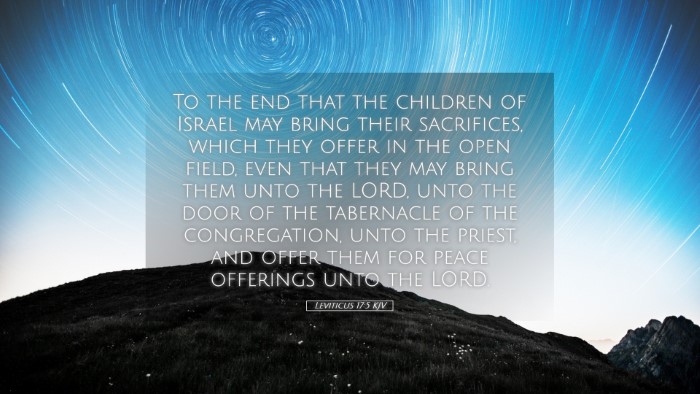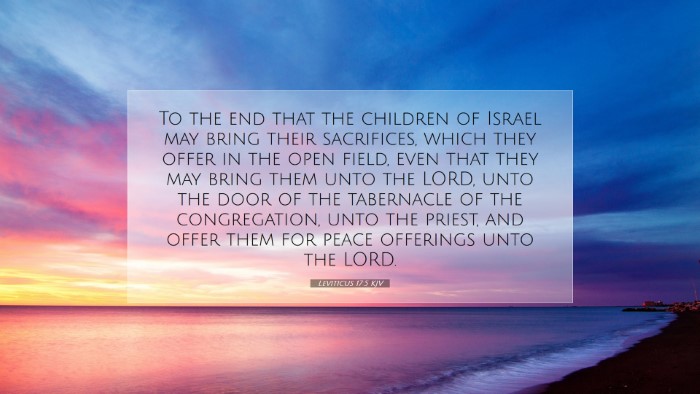Commentary on Leviticus 17:5
Leviticus 17:5 states: "And they shall no more offer their sacrifices unto devils, after whom they have gone a whoring. This shall be a statute forever unto them throughout their generations." This verse contains profound implications about the nature of worship and the appropriateness of sacrifices within the covenant community. Below is a compilation of insights from several public domain commentaries aimed at providing a comprehensive understanding of this passage.
General Observations
The overall thrust of Leviticus is directed towards holiness, purity, and the instructions for worship that God demands from His people. This particular passage highlights God’s intention for Israelites to remain distinct from the practices of surrounding nations, particularly those that involve idol worship.
Matthew Henry’s Insights
Henry emphasizes the seriousness of the command regarding the sacrifices. He notes:
- Prohibition of Idolatry: The Israelites are warned against offering sacrifices to “devils,” which Henry interprets as reference to fallen angels or demonic entities. This signifies that God desires a pure and undivided worship free from external pagan influences.
- Call to Faithfulness: The phrase “gone a whoring” illustrates Israel’s spiritual infidelity, likening their idolatrous practices to adultery. Henry’s commentary stresses the covenant relationship between God and His people that should not be broken by the temptations of surrounding cultures.
- Statute for Generations: The injunction serves as a perpetual reminder to future generations, reinforcing the ongoing necessity of adhering to God’s commands, rejecting any allure of pagan practices.
Albert Barnes’ Perspective
Barnes notes the cultural context surrounding this command:
- Historical Background: He points out that the practices of sacrifice were common among nations at the time, and the Israelites faced pressure to conform. Barnes draws attention to how this passage firmly establishes the uniqueness of Israel's worship in stark contrast to the barbaric rites of neighboring peoples.
- Clarifying the Nature of Sacrifice: The sacrifices prescribed by the Law were intended for the worship of Jehovah alone. Offering sacrifices to other entities was not only a breach of the first commandment but also a dilution of the community’s collective identity as the people of God.
- Significance of 'Devils': Barnes elaborates on the term “devils,” which may refer to any false gods, stressing that these so-called gods were but mere idols and that the sacrifices were essentially useless. The necessity of devotion to the true God is underscored here.
Adam Clarke’s Analysis
Clarke provides a theological examination of this verse:
- Moral Implications: He recognizes that the moral and ethical implications are significant, urging that fidelity to God is paramount. Clarke mentions that engaging in such sacrifices corrupts both the individual and the community.
- Social Responsibility: The verse also implies that the practices of individuals can affect the entire community. When idols were being worshipped, it would not only lead to personal sin but also communal failure.
- Eternal Nature of the Statute: Clarke highlights that the laws were not merely for the ancient Israelites but are applicable in principle to later generations, including the modern church. The call to purity in worship and the rejection of idolatry continues to resonate with contemporary believers.
Theological Implications
This verse challenges readers to reflect on modern forms of idolatry and the various “devils” that may be worshipped today through materialism, power, and status. The steadfastness to worship and serve God alone is enduring and necessary for both personal integrity and communal holiness.
Practical Application
For pastors, students, and theologians, Leviticus 17:5 underscores the following practical points:
- Maintain Distinct Worship: Believers are called to offer their lives as living sacrifices, wholly devoted to God (Romans 12:1). Each act of worship should reinforce a rejection of secular influences and cultural idolatry.
- Teach Future Generations: It is important to impart a clear understanding of God’s commands regarding worship to ensure that future generations remain faithful. The teachings of Christ and the Apostles align with the principles found in Levitical law.
- Cultivate Community Accountability: Communities of faith should be vigilant against influences that may lead to spiritual infidelity. Building a culture of accountability and purity in worship will strengthen the community’s commitment to God.
Conclusion
Leviticus 17:5 serves as a poignant reminder of the importance God places on pure worship. The insights gleaned from the commentaries of Matthew Henry, Albert Barnes, and Adam Clarke highlight the timeless relevance of this admonition. By maintaining fidelity to God, rejecting idolatry, and teaching future generations, believers can continue in a vibrant and holy relationship with the Almighty.


